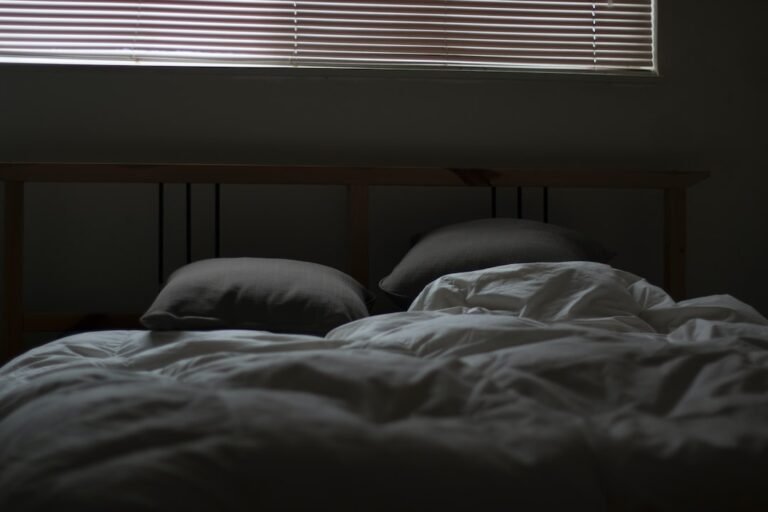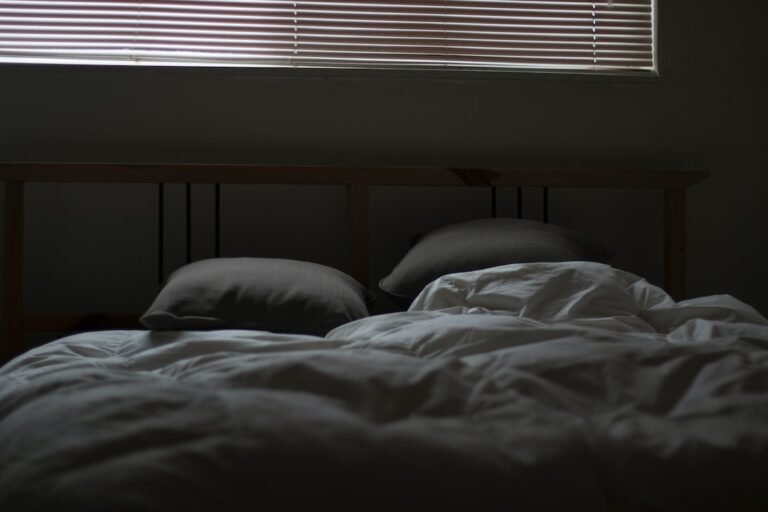Sleep Better, Live Better: Tips to Promote Healthy Sleep
Quality sleep is essential for overall health and well-being. It plays a crucial role in maintaining physical, mental, and emotional health. Unfortunately, many people underestimate the importance of sleep and neglect to prioritize it in their daily lives. In this article, we will explore the benefits of quality sleep, the negative effects of poor sleep, common sleep disorders, how to create a sleep-conducive environment, establish a consistent sleep schedule, practice relaxation techniques and mindfulness, incorporate exercise and a healthy diet, avoid stimulants and electronics before bedtime, manage stress and anxiety, choose the right mattress and pillows, and seek professional help for persistent sleep issues.
Understanding the Importance of Quality Sleep for Your Health and Well-being
Quality sleep is essential for optimal functioning of the body and mind. It helps to restore and rejuvenate the body’s systems, allowing them to function at their best. During sleep, the body repairs damaged cells, boosts the immune system, regulates hormones, and consolidates memories. Lack of quality sleep can lead to a wide range of health problems including obesity, diabetes, cardiovascular disease, and mental health disorders such as depression and anxiety.
On the other hand, getting enough quality sleep has numerous benefits. It improves cognitive function, enhances memory and learning abilities, increases productivity and creativity, improves mood and emotional well-being, strengthens the immune system, reduces inflammation in the body, promotes healthy weight management, lowers the risk of chronic diseases such as diabetes and heart disease, and improves overall quality of life.
Common Sleep Disorders and How to Identify Them
There are several common sleep disorders that can significantly impact sleep quality. These include insomnia, sleep apnea, restless leg syndrome (RLS), and narcolepsy.
Insomnia is characterized by difficulty falling asleep or staying asleep. People with insomnia often experience daytime fatigue, irritability, difficulty concentrating, and decreased performance at work or school. Sleep apnea is a disorder in which breathing repeatedly stops and starts during sleep. It can lead to loud snoring, gasping or choking during sleep, morning headaches, daytime sleepiness, and difficulty staying asleep.
Restless leg syndrome is a condition that causes an uncontrollable urge to move the legs, usually due to uncomfortable sensations such as tingling or crawling. This can make it difficult to fall asleep or stay asleep. Narcolepsy is a neurological disorder that affects the brain’s ability to regulate sleep-wake cycles. People with narcolepsy often experience excessive daytime sleepiness, sudden loss of muscle tone (cataplexy), hallucinations, and sleep paralysis.
If you suspect that you may have any of these sleep disorders, it is important to consult with a healthcare professional for a proper diagnosis and treatment plan.
Creating a Sleep-Conducive Environment in Your Bedroom
Creating a sleep-conducive environment in your bedroom is essential for promoting quality sleep. There are several factors to consider when setting up your bedroom for optimal sleep.
Temperature control is crucial for a comfortable sleep environment. The ideal temperature for sleep is around 65 degrees Fahrenheit (18 degrees Celsius). It is important to keep your bedroom cool and well-ventilated to promote better sleep.
Lighting also plays a significant role in sleep quality. Exposure to bright light before bedtime can interfere with the body’s natural sleep-wake cycle. It is important to minimize exposure to artificial light from electronic devices such as smartphones, tablets, and computers, as well as bright overhead lights in the evening. Using blackout curtains or an eye mask can also help create a dark environment that promotes better sleep.
Noise reduction is another important factor in creating a sleep-conducive environment. Excessive noise can disrupt sleep and make it difficult to fall asleep or stay asleep. Using earplugs or white noise machines can help mask unwanted noise and promote better sleep.
Finally, comfortable bedding is essential for a good night’s sleep. Investing in a high-quality mattress and pillows that provide adequate support and comfort can make a significant difference in sleep quality. It is important to choose bedding that suits your individual preferences and needs.
Establishing a Consistent Sleep Schedule to Promote Healthy Sleep
Establishing a consistent sleep schedule is crucial for promoting healthy sleep. Our bodies have an internal clock, known as the circadian rhythm, which regulates our sleep-wake cycle. Going to bed and waking up at the same time every day helps to regulate this internal clock and promote better sleep.
The importance of a consistent sleep schedule cannot be overstated. Irregular sleep patterns can disrupt the circadian rhythm and lead to poor sleep quality. It is important to prioritize sleep and make it a priority in your daily routine.
To establish a consistent sleep schedule, it is important to set a regular bedtime and wake-up time and stick to it, even on weekends. Avoid napping during the day, as this can interfere with nighttime sleep. Create a relaxing bedtime routine that signals to your body that it is time to wind down and prepare for sleep. This can include activities such as reading, taking a warm bath, or practicing relaxation techniques.
Relaxation Techniques and Mindfulness Practices to Help You Fall Asleep

Relaxation techniques and mindfulness practices can be effective tools for promoting better sleep. These techniques help to calm the mind and relax the body, making it easier to fall asleep and stay asleep.
Deep breathing exercises are a simple yet powerful relaxation technique that can help promote better sleep. Taking slow, deep breaths in through the nose and out through the mouth can help activate the body’s relaxation response and reduce stress and anxiety.
Progressive muscle relaxation involves tensing and then relaxing each muscle group in the body, starting from the toes and working your way up to the head. This technique helps to release tension and promote relaxation.
Mindfulness meditation involves focusing your attention on the present moment, without judgment. This practice can help calm the mind and reduce racing thoughts that can interfere with sleep. There are many guided meditation apps and videos available that can help you get started with mindfulness meditation.
The Role of Exercise and Diet in Promoting Healthy Sleep
Exercise and diet play a significant role in promoting healthy sleep. Regular physical activity has been shown to improve sleep quality and duration. It helps to reduce stress, anxiety, and depression, which can interfere with sleep. Exercise also increases the production of endorphins, which are natural mood boosters that promote relaxation and better sleep.
It is important to note that exercising too close to bedtime can have a stimulating effect on the body and make it difficult to fall asleep. It is recommended to finish exercising at least 2-3 hours before bedtime to allow the body enough time to wind down.
In addition to exercise, diet also plays a role in promoting healthy sleep. Certain foods can help promote better sleep, while others can interfere with sleep. Foods that are rich in tryptophan, such as turkey, chicken, nuts, seeds, and dairy products, can help promote better sleep. Tryptophan is an amino acid that is converted into serotonin and melatonin in the body, both of which are important for regulating sleep.
On the other hand, it is best to avoid consuming large meals or heavy, spicy, or fatty foods close to bedtime, as these can cause indigestion and disrupt sleep. It is also important to limit caffeine intake, especially in the afternoon and evening, as it can interfere with sleep.
Avoiding Stimulants and Electronics Before Bedtime
Stimulants such as caffeine and nicotine can have a significant impact on sleep quality. Caffeine is a stimulant that can stay in your system for several hours and interfere with sleep. It is best to avoid consuming caffeine in the afternoon and evening, or at least limit your intake.
Nicotine is another stimulant that can disrupt sleep. It is best to avoid smoking or using nicotine products close to bedtime.
In addition to stimulants, electronic devices such as smartphones, tablets, and computers emit blue light, which can interfere with the body’s natural sleep-wake cycle. The blue light emitted by these devices suppresses the production of melatonin, a hormone that regulates sleep. It is best to avoid using electronic devices at least an hour before bedtime to promote better sleep.
Tips for Managing Stress and Anxiety to Improve Sleep Quality
Stress and anxiety can have a significant impact on sleep quality. When we are stressed or anxious, our bodies produce stress hormones such as cortisol, which can interfere with sleep. Chronic stress and anxiety can lead to insomnia and other sleep disorders.
There are several strategies that can help manage stress and anxiety and improve sleep quality. Engaging in relaxation techniques such as deep breathing exercises, progressive muscle relaxation, and mindfulness meditation can help calm the mind and relax the body.
Engaging in regular exercise can also help reduce stress and anxiety. Physical activity releases endorphins, which are natural mood boosters that promote relaxation and better sleep.
It is also important to practice good stress management techniques such as time management, setting boundaries, and seeking support from friends, family, or a mental health professional if needed.
How to Choose the Right Mattress and Pillows for Your Sleep Needs
Choosing the right mattress and pillows is essential for promoting quality sleep. There are several factors to consider when choosing a mattress and pillows that suit your individual needs.
When choosing a mattress, it is important to consider factors such as firmness, support, and comfort. The ideal firmness level depends on personal preference and individual needs. Some people prefer a firmer mattress for more support, while others prefer a softer mattress for more comfort. It is important to choose a mattress that provides adequate support for your body and aligns the spine properly.
Pillows also play a crucial role in sleep quality. The right pillow should provide adequate support for the head and neck, keeping them aligned with the spine. There are different types of pillows available, such as memory foam, latex, down, and synthetic fill. It is important to choose a pillow that suits your individual preferences and needs.
Seeking Professional Help for Persistent Sleep Issues
If you are experiencing persistent sleep issues despite implementing healthy sleep habits, it may be necessary to seek professional help. There are several healthcare professionals who specialize in sleep medicine and can help diagnose and treat sleep disorders.
A sleep specialist is a healthcare professional who specializes in diagnosing and treating sleep disorders. They may conduct a sleep study, which involves monitoring your sleep patterns and brain activity overnight in a sleep lab or at home.
Other healthcare professionals who can help with sleep issues include primary care physicians, psychologists, psychiatrists, and naturopathic doctors. It is important to consult with a healthcare professional to determine the underlying cause of your sleep issues and develop an appropriate treatment plan.
In conclusion, quality sleep is essential for overall health and well-being. It plays a crucial role in maintaining physical, mental, and emotional health. Understanding the importance of quality sleep and implementing healthy sleep habits can have a significant impact on sleep quality and overall quality of life. By creating a sleep-conducive environment, establishing a consistent sleep schedule, practicing relaxation techniques and mindfulness, incorporating exercise and a healthy diet, avoiding stimulants and electronics before bedtime, managing stress and anxiety, choosing the right mattress and pillows, and seeking professional help when needed, you can improve your sleep quality and enjoy the many benefits of quality sleep.







